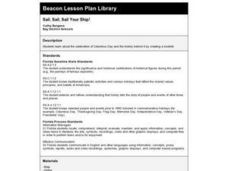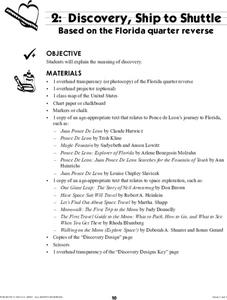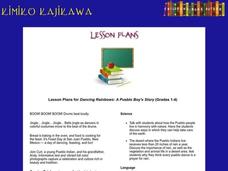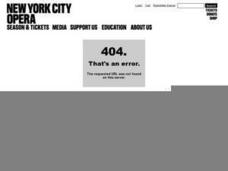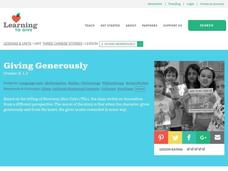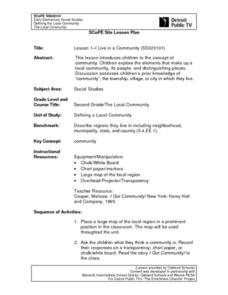Curated OER
Sail, Sail, Sail Your Ship!
Students listen to the book, Columbus Day, by Paul Showers and discuss the historical significance of Christopher Columbus. They create Columbus Day booklets, sing a Christopher Columbus song, and develop graphic organizers.
Curated OER
Native Americans of the USA
Students, in cooperative groups, research a variety of Native American tribes on the Internet and complete corresponding activities. They participate in a play about Native Americans by Sandra Widener.
Curated OER
Discovering the World Virtually
Students experience world adventures through the internet. In this technology activity, students use a suggested internet site and explore each expedition. Students can virtually travel such lands as China.
Curated OER
Australian Aborigines
Students research the art and culture of the Australian Aborigines.
Curated OER
Discovery, Ship to Shuttle
Pupils define the meaning of discovery, and view and discuss the images on the Florida Quarter. They read about Ponce de Leon and the space shuttle, and complete a chronological order activity.
Curated OER
Valley Forge
Learners describe how location, weather, and physical environment affect the way people live, including the effects on their food, clothing, shelter, transportation, and recreation. They also describe the lives of American heroes who...
Curated OER
Rosh Hashanah and Yom Kippur
Students research the importance of Rosh Hashanah and Yom Kippur. In this holiday lesson, students are introduced to the meaning behind these Jewish holidays and identify geography of Israel.
Curated OER
Dancing Rainbows: A Pueblo Boy's Story
Students read the book "Dancing Rainbows," and complete a variety of activities across the curriculum. In this Native Americans lesson plan, students create pottery, discuss Pueblo traditions, discuss the importance of rain, and learn...
Curated OER
LA CENERENTOLA (Cinderella)
Students work in groups to create a map key. The map key represents the diversity of each of the Cinderella stories previously read. They explore the cultural dimensions and contributions of the arts.
Curated OER
The Hunter Using Children's Literature to Teach the Geography of Africa
Students are able to answer basic questions about the region and the use of natural resources, sketch a mental map of the story's setting, and find their way through the thematic maze/map.
Curated OER
Giving Generously
Students explore philanthropy. In this service learning lesson, students read Runaway Rice Cake, identify the elements of the story, and make rice cakes to share with others.
Curated OER
LA CENERENTOLA (Cinderella)
Students investigate different cultures' versions of the Cinderella tale in comparison to the Rossini opera synopsis. They experience dramatizing a Cinderella tale and study about the group and individual process required for theatrical...
Curated OER
More Than Anything Else
Second graders investigate the life of Booker T. Washington by reading a biography. In this biographical lesson, 2nd graders read the story More Than Anything Else, and examine the geographical locations Washington once resided in. ...
Curated OER
Lesson 1-I Live in a Community
Second graders brainstorm the concept of a community and all the elements involved in the make up of one. They pull from the resources on the community that they already live in or have lived in. In addition, they share their reflections...
Curated OER
Morgan's Raid in Ohio
Learners examine the cause, effect, and impact of Morgan's Ohio raid during the Civil War. They complete unit sections on the raid, dates, viewpoints, results, and historic markers.
Curated OER
The Voice of the Individual
Students examine the role of the individual in society as a whole. Individually, they design and create their own calling card as used in the past. They put together an art kit in which they are able to use outdoors. To end the...
Curated OER
Learning to Swim in Swaziland
Young scholars explore everyday life in Swaziland and compare and contrast it to their own everyday life.
Curated OER
The Flag Contest
Students, in groups, discuss the different parts of the Arkansas flag. They are given fabric of their own to design a flag to represent their family.
Curated OER
Grinding corn in Swaziland
Students participate in grinding corn, a major part of food preparation in rural Swaziland.
Curated OER
Bringing the Past to the Present
Second graders work in pairs and read a primary source artifact. They create a PowerPoint slide that will be part of a "museum" presentation for the rest of their class. Students select artifacts from a group of digitalized artifacts...
Curated OER
The Day of Ahmed's Secret
Young scholars create a postcard showing and telling something they have learned about Cairo, Egypt.
Curated OER
Africa: Journey To a Wildlife Park
Students identify similarities and differences between Rehema's life and culture, and their own.
Curated OER
The Day of Ahmed's Secret
Learners create a postcard showing something they have learned about Cairo, Egypt.
Curated OER
Stone Soup
Young scholars explain how various cultures affect the interactions that take place in a community. They compare and contrast families by where they live, the jobs they hold and the types of food they eat. Using examples, they sort goods...


